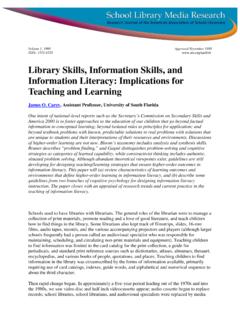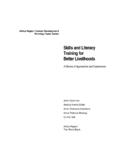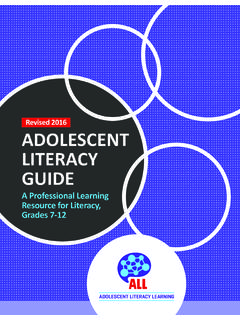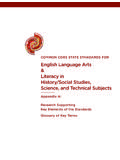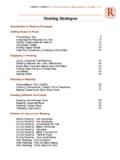Transcription of INSTITUTE FOR STATISTICS Literacy Skills for the World of ...
1 INSTITUTE FOR STATISTICSUNESCOINSTITUTEforSTATISTICS[] Executive SummaryLiteracy Skills for the World of tomorrow FURTHER RESULTS fromPISA 2000 ORGANISATION forECONOMIC CO-OPERATION andDEVELOPMENTLITERACY Skills FOR THE World OF tomorrow FURTHER RESULTS FROM PISA 2000 EXECUTIVE SUMMARYORGANISATION FOR ECONOMIC CO-OPERATION AND DEVELOPMENTUNESCO INSTITUTE FOR STATISTICS2 Organisation for Economic Co-operation and DevelopmentPursuant to Article 1 of the Convention signed in Paris on December 14, 1960, and which came into force onSeptember 30, 1961.
2 The Organisation for Economic Co-operation and Development (OECD) shall promote policiesdesigned to: achieve the highest sustainable economic growth and employment and a rising standard of living in Membercountries, while maintaining financial stability, and thus to contribute to the development of the World economy; contribute to sound economic expansion in Member as well as non-member countries in the process of economicdevelopment; and contribute to the expansion of World trade on a multilateral, non-discriminatory basis in accordance withinternational original Member countries of the OECD are Austria, Belgium, Canada, Denmark, France, Germany, Greece,Iceland, Ireland, Italy, Luxembourg, the Netherlands, Norway, Portugal, Spain, Sweden, Switzerland, Turkey, theUnited Kingdom and the United States.
3 The following countries became Members subsequently through accession atthe dates indicated hereafter: Japan (April 28, 1964), Finland (January 28, 1969), Australia (June 7, 1971), NewZealand (May 29, 1973), Mexico (May 18, 1994), the Czech Republic (December 21, 1995), Hungary (May 7, 1996),Poland (November 22, 1996), Korea (December 12, 1996) and the Slovak Republic (December 14, 2000). TheCommission of the European Communities takes part in the work of the OECD (Article 13 of the OECDC onvention).
4 UNESCOThe constitution of the United Nations Educational, Scientific and Cultural Organization (UNESCO) was adopted by20 countries at the London Conference in November 1945 and entered into effect on November 4, 1946. TheOrganization currently has 188 Member main objective of UNESCO is to contribute to peace and security in the World by promoting collaboration amongnations through education, science, culture and communication in order to foster universal respect for justice, the ruleof law, and the human rights and fundamental freedoms that are affirmed for the peoples of the World , withoutdistinction of race, sex, language or religion, by the Charter of the United fulfill its mandate.
5 UNESCO performs five principal functions: 1) prospective studies on education, science, cultureand communication for tomorrow s World ; 2) the advancement, transfer and sharing of knowledge through research,training and teaching activities; 3) standard-setting actions for the preparation and adoption of internal instrumentsand statutory recommendations; 4) expertise through technical co-operation to Member States for their developmentpolicies and projects; and 5) the exchange of specialized is headquartered in Paris, UNESCO INSTITUTE for StatisticsThe UNESCO INSTITUTE for STATISTICS (UIS) is the statistical office of UNESCO and is the UN depository for globalstatistics in the fields of education, science and technology, culture and was established in 1999.
6 It was created to improve UNESCO s statistical programme and to develop and deliverthe timely, accurate and policy-relevant STATISTICS needed in today s increasingly complex and rapidly changing social,political and economic is based in Montr al, credit: OECD/UNESCO-UIS 2003 Permission to reproduce a portion of this work for non-commercial purposes or classroom use should be obtainedthrough the Centre fran ais d exploitation du droit de copie(CFC), 20, rue des Grands-Augustins, 75006 Paris, France,tel.
7 (33-1) 44 07 47 70, fax (33-1) 46 34 67 19, for every country except the United States. In the United States,permission should be obtained through the Copyright Clearance Center, Customer Service, (508) 750-8400,222 Rosewood Drive, Danvers, MA 01923, USA, or CCC Online ( ). All other applications forpermission to reproduce or translate all or part of this book should be made to OECD Publications, 2, rue Andr -Pascal, 75775 Paris Cedex 16, France or UNESCO Publishing, Editorial and Rights Division, 7, place de Fontenoy,75352 Paris 07 SP or 1, rue Miollis, 75732 Paris Cedex 15, France.
8 Fax: (33-1) 45 68 57 39. Tel. (33-1) 45 68 49 designations employed and the presentation of material throughout this publication do not imply the expression of any opinionwhatsoever on the part of UNESCO and OECD concerning the legal status of any country, territory, city or area or of its authorities,or the delimitation of its frontiers or Skills for the World of tomorrow Further results from PISA 2000 Executive SummaryThe Programme for International Student Assessment (PISA) is a collaborativeeffort among the participating countries to measure how well 15-year-olds,approaching the end of compulsory schooling, are prepared to meet thechallenges of today s societies.
9 PISA administers tests and backgroundquestionnaires to between 4,500 and 10,000 students in each participatingcountry to assess three forms of Literacy : reading, mathematical and assessments focus on how well students apply knowledge and Skills to tasksthat are relevant to their future life, rather than on the memorisation of subjectmatter assessment was first administered in 2000 in 32 countries, all but four ofthem members of the Organisation for Economic Co-operation andDevelopment (OECD) (See Figure 1).
10 In response to considerable worldwideinterest in the study, the assessment was extended in 2001 to 11 additional non-OECD countries, bringing the total number of countries surveyed to 43. Theresults for the first 32 countries were reported in Knowledge and Skills for Lifepublished in Skills for the World of Tomorrowexpands on this analysiswith particular reference to the results in the 15 non-OECD provides important information on factors associated with students Literacy proficiency, including student engagement in the learning process,gender and family background, and offers insights into how characteristics ofschools.











